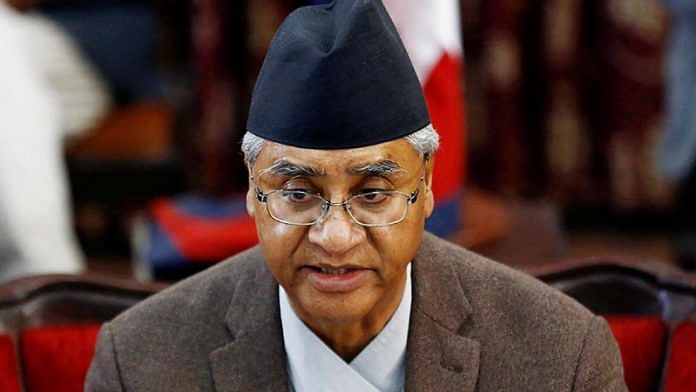New Delhi: Sher Bahadur Deuba, 75, was Tuesday sworn in as the Prime Minister of Nepal for the fifth time.
His appointment comes at a time Kathmandu is seeking political stability while strengthening its constitutional democracy, after six turbulent months of internal political turmoil.
The decision of Nepal’s Supreme Court to appoint Deuba, leader of the opposition Nepali Congress, is being termed as “unprecedented and historic” — one that will strengthen the country’s Constitution, sources in Nepal told ThePrint.
The sources also said Deuba will be able to prove his majority in Parliament before the one-month time given to him, which will guarantee him a full tenure.
The present political turmoil in Nepal began in December 2020 when former prime minister K.P.S. Oli dissolved the 275-member House of Representatives — the lower house of the country’s Parliament — putting a question mark on the validity of the Constitution.
The crisis peaked in May this year when Oli repeated the action despite massive resistance across all political parties.
All these developments led to the complete split of the Nepal Communist Party, which was created by uniting CPN-UML and CPN (Maoist Centre) in 2018. The process had began in December itself.
Meanwhile, Deuba’s oath-taking ceremony Tuesday also witnessed a lot of drama with President Bidya Devi Bhandari refusing to make it clear that the appointment of the new PM was taking place according to Article 76 (5) of the Nepal Constitution, which stipulates that it is mandatory to secure a vote of confidence in the House within 30 days of taking oath.
According to sources, Deuba has the support of Pushpa Kumar Dahal-led Communist Party of Nepal (Maoist-Centre), Baburam Bhattarai-Upendra Yadav led faction of the Janbadi Samajwadi Party (JSP) and the UML’s Madhav Nepal-Jhalanath Khanal.
Under Deuba, the sources added, Nepal will make an effort to balance ties between New Delhi and Beijing. Under Deuba’s rule earlier, bilateral ties between Nepal and India have seen better days.
Speaking to ThePrint, Bhattarai, former PM and chairman of JSP, called the top court’s verdict “historical”, and that his party remains “committed to overthrowing the despotic rule of Oli which was undemocratic and dictatorial”.
“We have created this new government after a lot of struggles and resistance and we are committed to overthrow Oli’s dictatorship and anti-democratic moves. The despotic elements cannot raise their heads anymore. This government will have to get the numbers. We are all united and we will get the numbers hopefully. We will have a majority and a stable government,” he said.
Bhattarai hoped that India will “now realise” the kind of resistance, public as well as political, Oli was facing and support a stable and democratic government in the Himalayan nation.
Also read: Nepal still ‘topsy-turvy’, its political system prone to not being stable: Ex-Indian envoy
India-Nepal ties
Bilateral ties between India and Nepal have undergone massive turbulence since May 2020 when Oli issued a new political map of Nepal, which included disputed regions — Kalapani, Lipulekh and Limpiyadhura — with India as part of their territory.
Nepal even amended its Constitution last year to include the new map as part of its national emblem.
According to experts, while the boundary row remains an outstanding issue between the two countries, it will take a long time to resolve it.
“The boundary issue is complicated and will take time to resolve. India needs an assurance that the outcome of any bilateral negotiations is endorsed by a two-thirds majority in the Nepalese parliament since it involves a constitutional amendment,” Ranjit Rae, former Indian envoy to Kathmandu, told ThePrint.
By appointing Deuba, he added, the Supreme Court of Nepal has “upheld and protected” the country’s Constitution.
“It has stated that the actions of the President are subject to judicial review and that the court will step in to correct the President’s decisions if they are not in conformity with the Constitution. The court has directly appointed the Prime Minister. These decisions will have long term political ramifications for Nepal,” he said.
Oli had even taken a shot at India’s national emblem, the Lion Capital, and motto ‘Satyameva Jayate (truth alone prevails)’, by saying New Delhi is now following the motto “simheva jayate (lion, signifying strength, wins)”.
Meanwhile, a day after Deuba’s swearing-in, India’s envoy to Kathmandu Vinay Mohan Kwatra called on the new Prime Minister Wednesday and spoke about deepening bilateral ties.
Honoured to call on @DeubaSherbdr; extended congratulations and best wishes on becoming PM of Nepal. Looking forward to working with his team to deepen the multifaceted India-Nepal partnership and people-to-people ties for common progress and prosperity.
@MEAIndia@PMOIndia pic.twitter.com/zKxzLJcG1C
— IndiaInNepal (@IndiaInNepal) July 14, 2021
China factor
Under Oli, Nepal had also been swaying to the Chinese tunes much to India’s discontent. At one point, New Delhi firmly believed that Oli’s map move had direct support of Beijing.
China has left no stone unturned to keep the squabbling factions of the NPC united. It had even sent a high-powered delegation headed by top echelons of the Chinese Communist Party (CPC) to bring them together ever since the turmoil began.
While the political turmoil was going on, earlier this month, Beijing said the CPC “stands ready to work with world political parties to live our dreams and act to create a better future”.
“The Chinese have burnt their fingers somewhat since the merger of the communist parties has unravelled. While they have stated that they will engage with all parties, their long term strategy to consolidate the communist force will remain,” said Rae.
(Edited by Neha Mahajan)
Also read: India ‘takes step back’ amid Nepal turmoil, believes onus on Kathmandu to protect constitution



